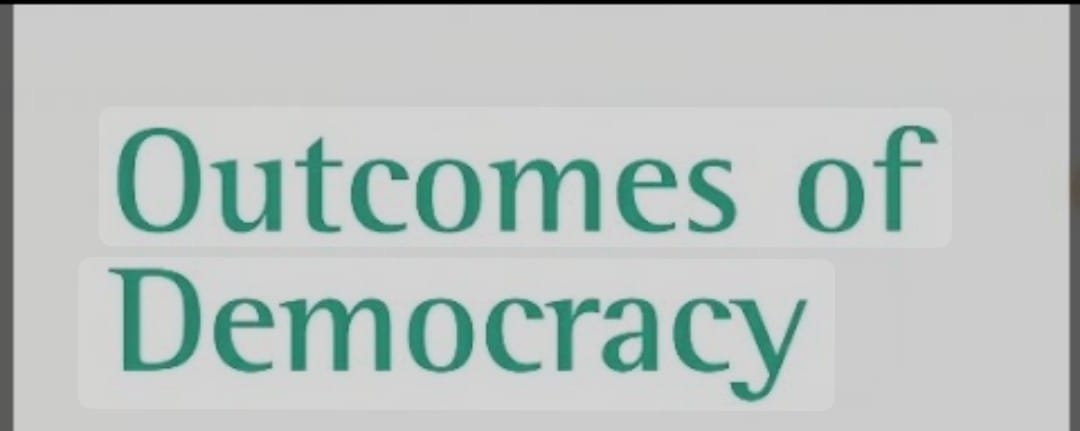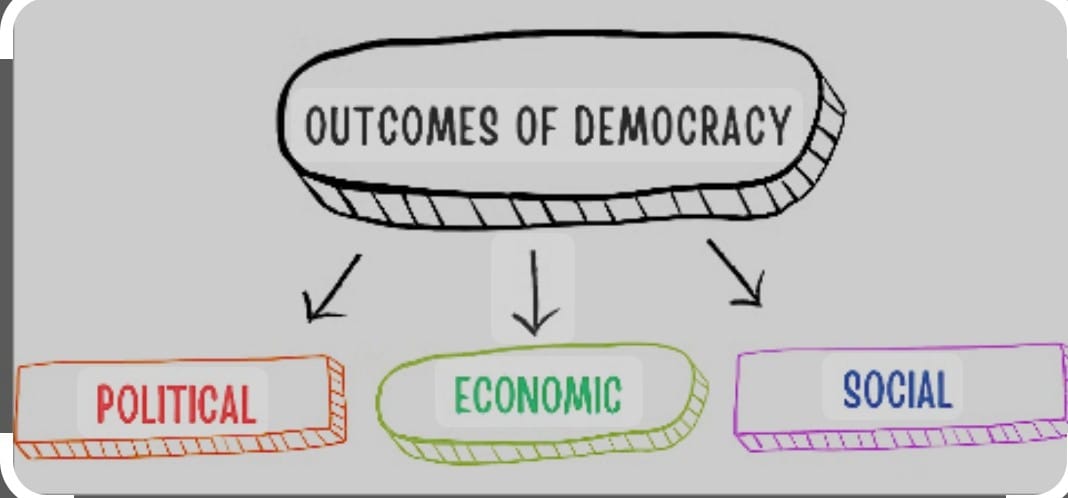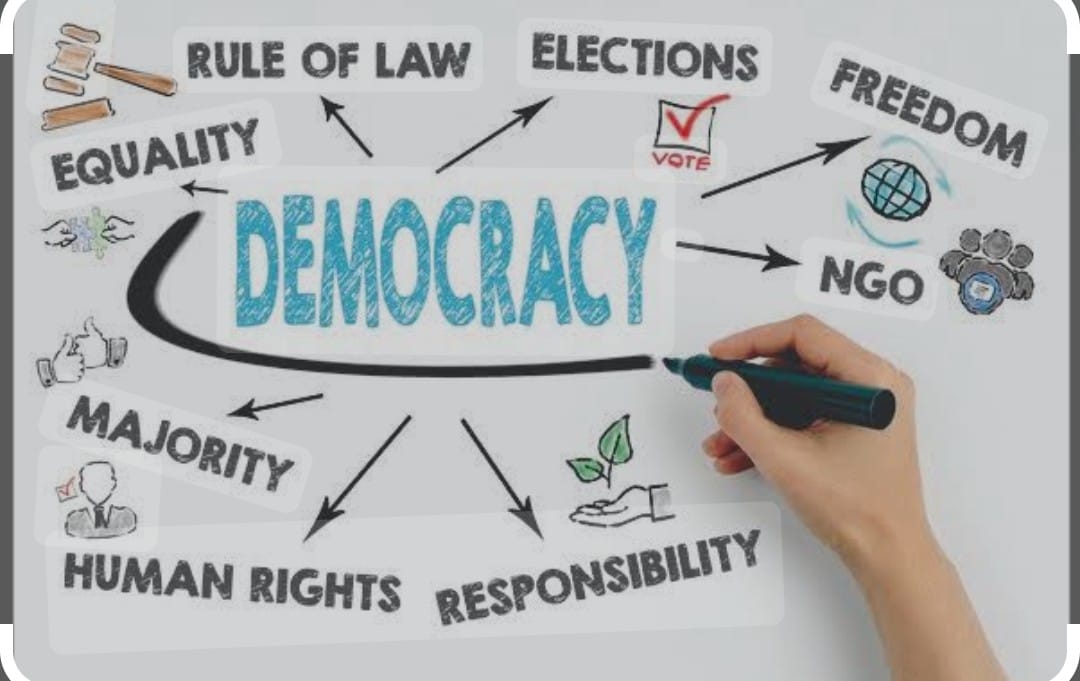Outcomes of Democracy
Outcomes of Democracy is the Chapter of Social Science For Class 1o Covering the complete syllabus of class 10 with the basic idea of Democracy and it’s outcomes in India.

We have studied that democracy is better than dictator for the following reasons:
a. Promotes equality among citizens;
b. Enhances the dignity of the individual;
c. Improves the quality of decision making;
d. Provides a method to resolve conflicts;
e. Allows room to correct mistakes.

However, democracy looks good in principle but it is felt not to be so good in practice.
Over a hundred countries of the world today claim and practice some kind of democratic politics: they have formal constitutions, they hold elections, they have parties and they guarantee rights of citizens.
While these features are common to most of them, these democracies are very much different from each other in terms of their social situations, their economic achievements and their cultures
Democracy as an Accountable, Responsive and Legitimate Government.

In a democracy we are concerned with the idea that people must have the right to choose their leaders and people must have control over the leaders.
People must have a say in the decision making which affects them all. Hence, Democracy produces a government which is accountable to its citizens.
Democracy does require time to take its decisions since, it has to take in to account all the citizens of the country. It has to follow procedures, think of the benefit of the whole country and then decide on an action. Hence, the time required to work through a decision is worth it.
Each and every citizen has the right to know the procedure of the decision being made for the laws for them. This is known as Transparency.
Democracy also holds free and fair elections, have public debates on major policies and legislations and citizen’s right to information.
However, Democracies are not able to provide to fair chance to everyone to participate in the elections. Also, Democracies do not have good record to sharing information with the general public.
The corruption plagues democracy as we are not completely free from the muscle power and money power in Politics.
Democracy is a legitimate government as it is for the people, by the people and of the people.
Democracy’s ability to generate its own support is another outcome.
Economic Growth and Development
Considering the case between 1950 – 2000, Dictatorship has shown a better economic growth than Democracy. However, this is not a reason to reject democracy.
The economic growth of the country depends upon the country’s population size, global situation, relations with other countries, etc. However, the difference in the economic growth in less developed countries with dictatorship and democracies is negligible.
Reduction of Inequality and Poverty
Democracies are based on political equalities. All citizens of the country have an equal weight over their votes. But on an economic aspect, There is a growing economic inequalities.
“Poor is becoming Poorer and the Rich is getting Richer.” The bottom people even find it difficult to achieve basic needs like Clothing, Shelter and Food.
In India, 21.9% of Indian Population is under Poverty Line.
The situation is worse in Bangladesh where over 50% population is under Poverty Line.
Accommodation of Social Diversity
Democracy is best suited to achieve the target of accommodation of social diversity.
However, it requires two conditions to achieve this:
a). It is necessary to understand that democracy is not simply rule by majority opinion.
The majority always needs to work with the minority so that governments function to represent the general view. Majority and minority opinions are not permanent.
b). It is also necessary that rule by majority does not become rule by majority community in terms of religion or race or linguistic group, etc.
Rule by majority means that in case of every decision or in case of every election, different persons and groups may and can form a majority.
Democracy remains democracy only as long as every citizen has a chance of being in majority at some point of time.
If someone is barred The two images depict two different kinds of effects democratic
politics can have on social divisions.
Take one example for each image and write a paragraph each on the outcome of democratic politics in both situations. from being in majority on the basis of birth, then the democratic rule ceases to be accommodative for that person or group.
.
Dignity and Freedom of Citizen
Democracy stands much superior to any other form of government in promoting dignity and freedom of the individual
Understanding the example of dignity of Women, Most societies are male dominated societies.
Long struggle by women has created a sense that equal treatment of women is necessary. That does not mean that women are actually always treated with respect.
But once the principle is recognized, it becomes easier for women to wage a struggle against what is now unacceptable legally and morally.
In a non-democratic set up, this unacceptability would not have legal basis because the principle of individual freedom and dignity would not have the legal and moral force there. The same is true of caste inequalities
Democracy in India has strengthened the claims of the disadvantaged and discriminated castes for equal status and equal opportunity. There are instances still of caste-based inequalities and atrocities, but these lack the moral and legal foundations.
“The fact that People are able to speak ill about democracy is a win for the Democracy itself.”
Conclusion :Out Comes of Democracy
Democracy, provides us several important outcomes such as Accountable and responsive government because Leaders have to consider public opinion as they have to face regular elections. Democratic processes provide legitimacy to the ruling authority, democracies tend to have more stable economic growth that gives reduction of inequality and poverty Democratic systems often implement welfare policies and social programs.
It allows peaceful coexistence of different social groups and values protect individual rights and promote equality and also provides mechanisms for peaceful resolution of differences.
Read More : Gender Religion and Caste
Read More : Political Parties
Follow us on : Facebook
Follows us on : Instagram